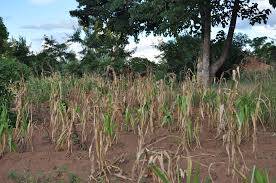
Reliefweb says Nine million people are at risk of being affected by both floods and droughts where the country has faced an extraordinary situation of rise in water levels in Lake Malawi since 1980 and nearby areas have withered crops, especially maize which is the country’s staple food.
This year’s maize harvest is expected to be nearly a quarter below average, and the price has already risen by 40% since last year, leaving farmers unable to plant their crops and families struggling to get by financially without water.
Mangochi district farmer, Kazembe Chikuni, said that this year he planted a lot of maize with the hope that the outcome would be different from last year but unfortunately, crops were destroyed by army worms, including those from other farmers in the community where he lives.
He said that the last time a similar severe drought occurred was in 2008 which affected a lot of people who were facing hunger due to poor harvests.
“Drought has brought in a lot of pests and diseases. It is so sad to see this tragedy,” he lamented.
WaterAid Southern Africa Regional Director, Robert Kampala said in recent years, there have been longer and more brutal droughts that have made rivers and wells dry, shriveling crops and causing problems to livelihoods.
Kampala said there is a need for urgent high income by the government and other partners considering that the issue at hand is a matter of life and death.
“Government should wake up, match their words with action, and deliver for those whose lives are destroyed daily by climate change. We should consider a mitigation system because it is important, apart from that we need to crucially see public finance for locally-led adaptation more than doubled and balanced to match amounts for mitigation. There’s no time for more excuses,” he explained
WaterAid installed solar-powered taps which were designed to be climate resilient to supply water in the affected communities and districts such as Mangochi.
The government, through the Ministry of Agriculture, says it has been working tirelessly to ensure that farmers adopt farming activities that are resilient and encouraging them to use irrigation systems.
Three countries in Southern Africa, Malawi, Zambia, and Zimbabwe were hit hard by drought. This is also on top of recovering from the cholera outbreak. The UN estimates that 3.5 million people need support to access safe water and prevent the spread of the waterborne disease. The latest Cholera outbreak in Zambia claimed 739 lives.














